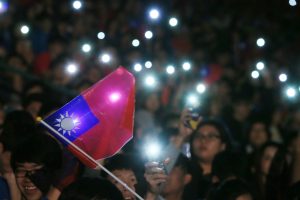On Saturday, Taiwanese singer Annie Yi drew criticisms from Taiwan for reaffirming her identity as a Chinese. Yi even remarked that her daughter’s favorite song is “I Love Beijing Tiananmen,” a song written to exalt Mao Zedong. Yi is not the first celebrity to disappoint the Taiwanese population with open declarations of supporting “One China.” Owing to mainland China’s vast market, many Taiwanese celebrities have either been forced to or chose to accord with mainland China’s political narratives.
That trend had already started back in 2015, when Taiwanese Chou Tzu-yu, a member of the K-pop group TWICE, was reported as a “pro-independence” celebrity for waving the flag of the Republic of China (ROC) on a Korean variety show. Chou released an apology video shortly after. The pressure on the then-teenager created an uproar in Taiwan that contributed one to two percentage points to presidential hopeful Tsai Ing-wen’s eventual win in the 2016 election.
Similar incidents have followed, making the realm of entertainment and culture a frequent point of political friction for the populations on both sides of the strait. In 2016 Taiwanese entertainer Show Luo lost about 10,000 fans on Facebook and gained around 50,000 fans on Weibo (the Chinese version of Twitter) after remarking “We are all Chinese” at a movie premiere. In 2019, Taiwanese performer Ouyang Nana hurried to “clarify” her support for “One China” and told the Chinese state media CCTV, “I am Chinese – I love my country,” after doubts of being pro-independence. The press has counted 42 of Taiwan’s top celebrities, such as Taiwan’s top model Lin Chi-Ling and singer Leehom Wang, who congratulated the PRC on its 70th anniversary while remaining silent on the national day of the ROC.
The preceding cases depict an evolving trend for ordinary mainland Chinese to witch-hunt “pro-independence” opinion leaders, taking the government’s “anti-independence” stance into their own hands. The Chou Tzu-yu incident was a collective political action initiated by patriotic Chinese internet users, which demonstrates a rare case of the Chinese population starting and leading a political dispute across the strait. Pressured by the mainland’s public opinion, Korean entertainment corporation JYP was believed to have pressed Chou to make the apology, which led to Taiwan’s public uproar.
The incident has revealed that the cultural realm has become a point of conflict between the populations across the strait. The Taiwanese realized that the patriotic mainland population are similar to their government in their use of political coercion and threatening Taiwan’s sovereignty. In light of mainland China’s rising nationalism, small innocuous displays of identity – from inadvertently giving Taiwan statehood to careless flag-waving – all risk being framed as acts of independence. In cases such as the Ruby Lin incident, where the Taiwanese actress was reported for starring in a program that received funding from Taiwan’s Ministry of Culture, it was the Chinese authorities that had to clarify her innocence.
The newfound of nationalist fervor of the Chinese population, however, does not automatically come with the political knowledge necessary to understand the complexity of national identities – such as differentiating between Taiwan and the ROC. On such issues, the mainland population often make mistakes that run counter to the official narrative of “one China with respective interpretations” within the “1992 Consensus” framework. In the Chou Tzu-yu incident, mainland China’s Taiwan Affairs Office refrained from criticizing Chou and remarked that the event was being “used” by certain political forces in Taiwan to “stir up the feelings of people on both sides of the Taiwan Strait.”
However, as Beijing has become more impatient with Taiwan’s autonomy and hopes to push for “one country, two systems” in Taiwan, the government has correspondingly grown more supportive of the mainland public’s witch-hunt. Just recently, the China Film Administration boycotted Taiwan’s Golden Horse awards. The result is that many Taiwanese celebrities now “declare loyalty” to Beijing to preserve their access to the mainland market but at the price of greater discontent from the Taiwanese population.
Given the negative repercussions observed after the Chou incident, why hasn’t the Chinese government reined in the mainland public? On the contrary, Chinese authorities have advocated greater conflicts between the two populations within the entertainment and culture realm. There are three possible explanations that may be working simultaneously.
First, the Chinese authorities might be trying to set up a political norm for cross-strait interactions, and thus celebrities as market-driven individuals with significant influence would be an easy target for setting an example. Second, the Chinese authorities might be trying to quell the growing fervor of their nationalist population. Given the external pressure and economic slowdown, utilizing nationalism to gain greater legitimacy has become the Chinese government’s standard measure. Third and lastly, Beijing might be attempting to co-opt Taiwanese opinion leaders and hope their popularity might change the Taiwanese public’s political attitude.
Regardless of which explanation is used, the Chinese government should understand that just as Chinese nationalists are willing to give up the NBA and Dolce & Gabbana to defend China’s sovereignty, the Taiwanese public is also willing to give up “pro-China celebrities” for political beliefs they value. Taiwan’s top internet celebrities such as Holger Chen gained and maintained their popularity by adopting an “anti-China” stance. If peaceful unification remains the optimal choice for Beijing, the leaders will need to understand that “promoting unification” and “anti-independence” measures can actually work at cross purposes.































